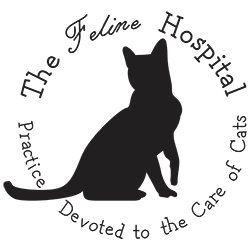Feline Nutrition - Obesity, Kidney Disease & Diet

As veterinary medicine continues to progress, we learn more every day about how integral nutrition is to our cats health. Most cat owners leave down a bowl of dry food to feed on free choice. Veterinarians have long recommended dry food. It has previously been thought that dry food helped to keep the teeth free of tartar. This has been disproven in recent years with the discovery that cats do not break up the food when they chew. For the most part, they swallow the kibble whole. Dry food only is no longer recommended for cats, especially in the form of free choice feeding. Currently, all of my cats eat exclusively canned food. I have fed and my cats have eaten exclusively canned food for the past seven years. We currently recommend that all cats eat canned food daily and that a portion of patients completely eliminate dry food from their diet all together. Cats ideally eat 3-4 times daily, and more than 4 meal times are preferred. Our cats, being small prey predators, would normally eat 4-10 times daily in the wild.
Cats are obligate carnivores, meaning an animal bases diet is essential. They also have almost no need for carbohydrates. The high carbohydrates in dry food are dealt with poorly, and often lead to obesity and can even contribute to diabetes. Dry food can also contribute to poor hydration. Cats are not good drinkers by nature. In fact, wild cats that are still true predators are rarely observed drinking in the wild. These cats hydrate themselves through their diet. They gain significant fluid from ingesting the tissues and viscera of their prey. We always need to look at how animals feed themselves in their natural environment, and pattern the cat diet after this approach. Canned food is much lower in carbohydrates and better assists in hydrating the cat.
I recommend canned food over dry food for several reasons, and will emphasize the need for canned food even more in certain conditions. Geriatric cats (9-10 years or older) especially benefit from a canned food diet. Elderly cats are often not well hydrated. This can lead to general malaise, and exacerbation of many underlying conditions, especially kidney disease. An exclusively dry diet has been linked to being a risk factor for the development of Chronic Renal Insufficiency. Canned food will not prevent or treat the disease, but staying well hydrated will minimize the effects of kidney disease. The other conditions for which I strongly recommend canned food over dry include obesity, Diabetes Mellitus, lower urinary tract disease (bladder stones and crystals), constipation, and some forms of gastrointestinal disease.
Nutrition is one of the most simple and pure forms of medicine. Therefore, we make nutritional recommendations for every patient. Some cats do not tolerate change well, and any attempts to alter their diet will need to be monitored closely. Nutritional changes should be made with the help of your cat’s veterinarian.
